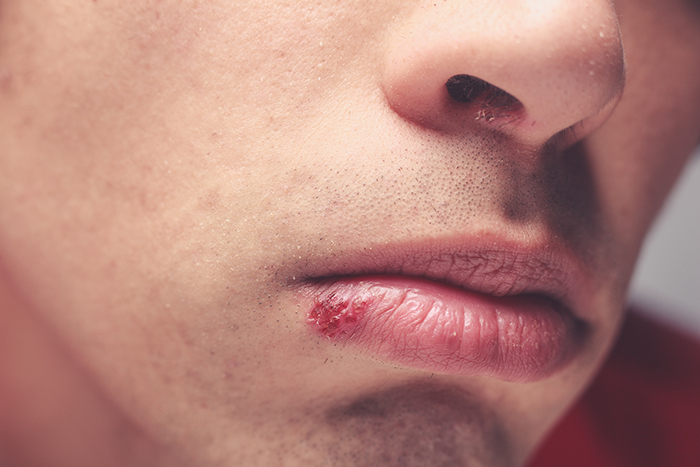Stop Cold Sores in Their Tracks

If you’re one of the millions of Americans who cope with cold sores, dealing with blisters is just a fact of life every once in a while.
The blisters appear on or around your mouth, break open and crust over, and go away within a couple of weeks. Then, the process may repeat itself at a later time.
What causes cold sores to return?
Researchers have known about some triggers for cold sores, such as stress, sunburn, or fever, for quite some time. But recent research in the online journal eLife has identified what happens within the body that triggers the herpes simplex virus-1 (HSV-1) out of dormancy and back to causing a cold sore.
According to Rivka Stone, M.D., Ph.D., a dermatologist at the University of Miami Health System and assistant professor of dermatology at the University of Miami Miller School of Medicine, the discovery could lead to future breakthroughs in possibly controlling and even preventing cold sores from recurring in the future.
“It appears that a chemical called interleukin-1 beta gets released in times of stress, fever, or in response to intense sunlight exposure,” says Dr. Stone. “This fires up an excitation pathway in neurons, which causes the herpes virus to travel back to the skin from its hiding spot in the nerves and cause a flare. In the future, if we can find new treatments to target this pathway, which is being hijacked by the virus, it could potentially minimize the number of outbreaks.”
How can I prevent a cold sore?
Though there currently is no cure for cold sores, once you have contracted the HSV-1 virus, you can still take steps to prevent them.
Naturally, take practical measures like:
- keep your stress in check through relaxation methods
- avoid lengthy sun exposure
- wear a broad-spectrum sunscreen with SPF 30 or above to prevent sunburn
- take steps to prevent illness or infection
“There are individual studies that link each of these factors to flares of cold sores in some patients,” says Dr. Stone. “Beyond cold sore prevention, avoiding sunburn and stress will keep your skin healthy and help you maintain a youthful appearance.”
Stop the spread of cold sores
Regardless of how careful you are, some cold sore flares may occur anyway when you have HSV-1. Treat them properly to heal the blisters and send the virus back into dormancy more quickly.
Dr. Stone says your treatment strategy will vary based on the frequency and severity of your cold sores. If you have mild, occasional cold sores, over-the-counter topical anesthetic medications are often adequate to treat the pain associated with the blisters, she says.
For more severe cold sores that cause pain and burning, Dr. Stone recommends talking to your health care provider about taking oral antiviral medications. Your doctor may even give you a prescription to keep on hand so that you can start taking medicine at the first sign of pain, burning, or tingling around your mouth, which may begin 1-2 days before the blisters appear. When you take it early, oral antiviral medications can relieve the symptoms and help the blisters crust and heal more quickly.
Finally, if you are prone to persistent episodes of cold sores, which may occur if you have a reduced immune response, your provider may suggest taking a low daily dose of suppressive antiviral medication, says Dr. Stone. These can reduce the frequency and severity of outbreaks.
The other concern for people with cold sores?
Prevent the spread to others. The American Academy of Dermatology says that the blisters should be considered contagious until they all have formed scabs. Until that time, they recommend that you avoid:
- Kissing or touching your face to other people.
- Sharing items that touch the face, such as food, drinks, razors, towels, and lip balm.
- Contact with babies who are particularly susceptible to the herpes virus.
And wash your hands frequently, particularly after touching or applying medicine to the mouth.
Wyatt Myers is a contributing writer for UMiami Health News.
Tags: cold sores, infection, infectious, skin
